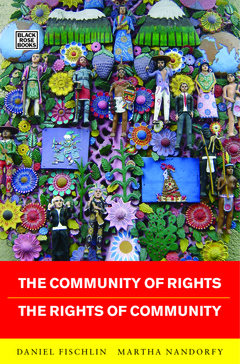New book by ICASP researcher Daniel Fischlin and Martha Nandorfy explores global human rights: The Community of Rights - The Rights of Community.

ICASP researcher Daniel Fischlin and Martha Nandorfy release an important contribution to the discussion about global human rights, The Community of Rights - The Rights of Community.
Community of Rights - Rights of Community enters into a dialogue with global communities about the meaning of being human and having rights. Why has the individual largely superseded community as the privileged focus of rights discourse? How have contemporary notions of community betrayed the very origins of the term in the name of exploitative economic and political practices? Is it possible to re-conceive rights discourse in ways that acknowledge the diverse communities from which they arise?
Following on the dialogue they initiated in Eduardo Galeano: Through the Looking Glass and The Concise Guide to Global Human Rights, Daniel Fischlin and Martha Nandorfy examine the assumptions made about community and expose the impact they have on human rights debates. This final volume of the trilogy looks beyond the framework that bankrupts rights of any real meaning and thus reaffirms the power and agency of communities in the face of neo-liberal discourses of privatization.
This book will be on the shelves of rights activists everywhere as an inspiration to their own work in building better communities.
"This book is a major contribution to a new discourse on the notion of rights in relation to community." [Roger Clark, former Secretary General of Amnesty International]
"This important book on the recovery of community rights shows how we lost our collective freedoms and how we can reclaim them." [Vandana Shiva, author]
Get your copy today: Community of Rights


